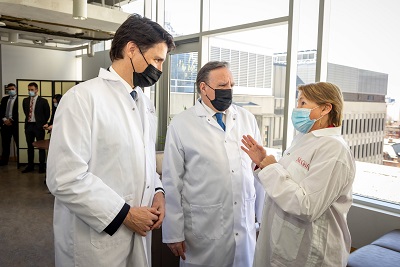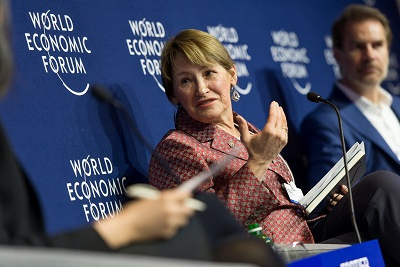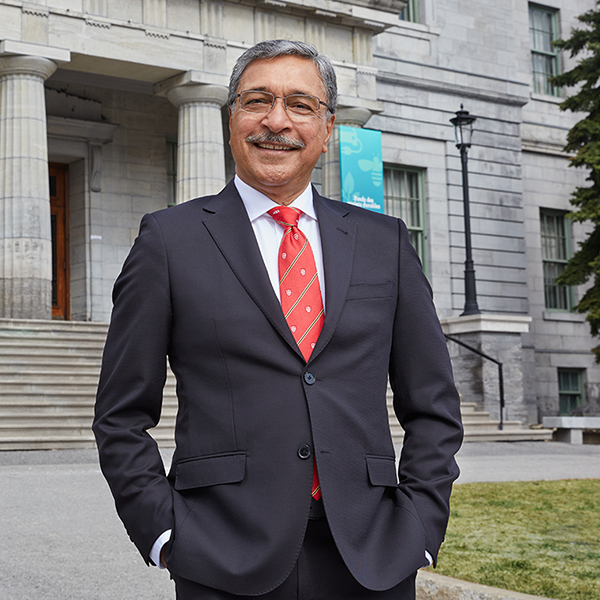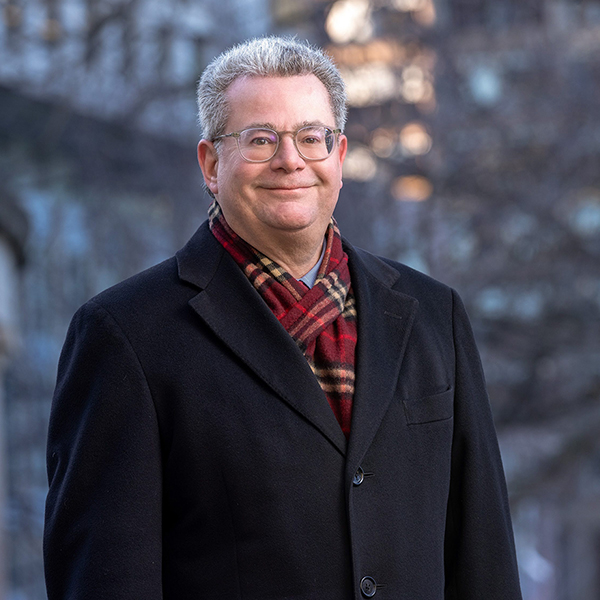McGill has undergone some profound changes during the last nine years as it prepared for its third century, achieving some spectacular successes, and weathering an unexpected pandemic. Leading the way through it all was Suzanne Fortier.
When asked to assess the impact that Suzanne Fortier, BSc’72, PhD’76, had on her alma mater as its principal for nine years, Ram Panda, MEng’71, MBA’77, gets straight to the point.
“I have been associated with McGill for a very long time, starting from my student days,” says Panda, the chair of McGill’s Board of Governors from 2017 until just recently, “and I believe this has been one of the most dynamic periods in its history.”
Fortier stepped down from her role as McGill’s 17th principal and vice-chancellor on September 5. There was certainly a lot going on at the University during her tenure.
An impressive legacy
Several prominent new academic centres were launched, including the School of Population and Global Health, the Max Bell School of Public Policy, and the Bensadoun School of Retail Management. McGill’s researchers have been impressively productive, attracting more than $262 million in federal funding for research and infrastructure grants in 2021 alone. McGill’s Healthy Brains, Healthy Lives initiative, the recipient of a landmark $84 million federal grant, cemented McGill’s reputation as a global leader in interdisciplinary neuroscience.
Major commitments have been made to EDI (equity, diversity and inclusion) initiatives and to improving student support programs (since the start of Fortier’s first term, McGill has increased funding for bursaries by 165 per cent and for entrance scholarships by 44 per cent). The University has completed work on much-needed infrastructure projects, including the Leacock Terrasse, McTavish Street, and the downtown campus’s central path from the Roddick Gates, beautifying the University in the process.
The McCall MacBain Scholarship program, the result of a gift from John and Marcy McCall MacBain and the largest donation in McGill history, was successfully launched. McGill embarked on its most ambitious fundraising campaign ever, Made by McGill: the Campaign for Our Third Century, with a goal of $2 billion (more than $1.65 billion has already been raised).
And, of course, there was that one thing in March of 2020 that no one saw coming.

“I think we were very fortunate to have someone like Suzanne,” adds Panda, “a seasoned leader, someone who was reflective and calm and absolutely committed to protecting the community while keeping the institution running. I had the opportunity to see it all close-up and I don’t think people fully understand how complex the challenges [associated with the pandemic] were. You look at where we are today. We have come through it in remarkably good shape.”
As McGill’s dean of science and as the academic lead of the New Vic Project, Bruce Lennox had plenty of opportunities to see Fortier in action. “She didn’t feel compelled to be the one who was always in the spotlight,” says Lennox. “She was objective driven. That was always her bottom line.”
Panda agrees. “She doesn’t like to bring attention to herself. She just likes to show the results. She lets the results speak for themselves.”
David Eidelman, MDCM’79, is McGill’s dean of medicine and health sciences as well as its vice-principal (health affairs). When faced with particularly sensitive dilemmas related to his portfolio, he valued Fortier’s input.
“She is very skilled at dealing with sometimes delicate issues,” says Eidelman. “She is often very creative in her thinking. She is very good at seeing the path forward.”
Admired by her peers
“Suzanne Fortier, in my view, has really been one of the great postsecondary leaders in Canada,” says Santa Ono, PhD’91, the president of the University of British Columbia, and the next president (as of October 13) of the University of Michigan.
Ono recently stepped down as the chair of the U15 group of leading Canadian research universities. Fortier was one of the organization’s vice-chairs. Ono says he valued Fortier’s input on a wide range of issues. “As a former president of [the Natural Sciences and Engineering Research Council], she is one of our nation’s top experts on research funding for investigator-initiated research projects.”
And as a proud McGill alum, Ono says he has kept tabs on how the University fared under her leadership. “I noticed that McGill was recently named the top Canadian university in the [2022 QS World University Rankings], and McGill has been in the top spot for years now in the medical-doctoral category of the Maclean’s rankings. I think that really is a testimony to Suzanne’s strategic leadership.”
Pierre Cossette, MSc’99, the rector of the Université de Sherbrooke, got to know Fortier through their mutual involvement in the Bureau de coopération interuniversitaire, an organization that, among other things, promotes the interests of Quebec’s universities and institutes of higher learning. Cossette and Fortier worked together on the BCI’s board of directors and later on its executive committee.
“Sitting on many boards internationally, she always brought a rich perspective, but she also had the capacity of putting her ideas and thoughts [into] Quebec’s reality,” says Cossette. “She has this capacity of being visionary, but also pragmatic and collaborative.”
Cossette, who has led Sherbrooke since 2017, cites Fortier as a role model – when he decided to run for the presidency of the BCI, “she gave me both support and good advice.
“I could say that working with Suzanne was kind of like having a master’s class [in university leadership] where I learned precious tips – without paying any fee!”
Connecting with Quebec
“She has built a very solid bridge for us with the Quebec government,” says Ram Panda. “And this has been very important for us because we’ve often been looked upon as an English university and she really wanted McGill to be recognized as a global university that was firmly rooted in Quebec. I think there is more recognition now of what an asset McGill is for Quebec.”
“I believe that under her leadership, McGill [moved into a better position] in Quebec’s university ecosystem, as she was able to demonstrate the richness and benefits that McGill brings to all,” says Cossette. “McGill is now better understood by decision makers here.”
“Her ability to advocate effectively for the University in Quebec [was] instrumental for us,” says Christopher Manfredi, McGill’s provost and vice-principal (academic) for most of Fortier’s tenure. “That was true when the Liberal Party was in power, and it is true now with the CAQ in power.”
During Fortier’s time as principal, the overall approach to funding higher education has improved for Quebec universities, and the provincial government has increased its grants to McGill for capital costs, money that has been used for urgent maintenance projects. In addition, the government has pledged its firm support for McGill’s New Vic Project and collaborated closely with McGill on the launch of Campus Outaouais, a new Faculty of Medicine and Health Sciences campus in the Outaouais region that offers its courses in French.

Photo: Sandra Blaser/World Economic Forum
Fortier was also very active on the international front, chairing the World Economic Forum’s Global University Leaders Forum. “She played an important role in strengthening McGill’s connections to an international network of partner universities and their researchers,” says Martha Crago, BA’68, MSc(A)’70, PhD’88, McGill’s vice-principal (research and innovation).
“She is a very detail-oriented person,” says Eidelman. “She wanted to hear about numbers. She is very meticulous. She [was] the proofreader-in-chief of the University. She regularly picked up on things that the rest of us missed. I don’t want to give the impression that she got lost in the details – far from it. She had the big picture in mind all the time.”
“She was always very thoughtful in how she approached [the issues she dealt with]. She has never been one to act rashly,” says Manfredi, who recently became McGill’s new interim principal and vice-chancellor.
“She is always herself”
Elizabeth Wirth, BA’64, is a Montreal-based business leader and philanthropist and a staunch champion of the Schulich School of Music. She and Fortier both share a tremendous admiration for the talents of McGill’s music students and for the quality of the Schulich School’s productions. That shared passion has blossomed into a deep friendship.
“There is a warmth and kindness to her as a person that people respond to,” says Wirth. “She [took] her role as principal very seriously, but she is totally unpretentious. She is always herself.”
“Whenever you see [Fortier] meet someone, she always has this natural poise and spontaneity,” says Louis Arseneault, McGill’s vice-principal (communications and external relations). “Whether it is a business leader or a community leader or a professor talking about their research or a student, she has a talent for putting people at ease.”
Mohammed Ashour, MSc’11, MBA’19, experienced that for himself. Today, Ashour is the CEO of Aspire Food Group, a global pioneer in insect agriculture. The company was co-founded by a group of McGill students who won the $1 million Hult Prize for their idea in 2013. After the victory, Ashour struggled with the challenges of transforming an innovative concept into a viable business.
“I remember sitting in [Principal Fortier’s] office where she would just let me blather on … ultimately asking me the Socratic questions that helped me come to the right decisions,” Ashour said in a recent video that paid tribute to Fortier’s contributions as principal. “She is a staunch advocate for her students.”
Access to a vital passport
Marc Weinstein, BA’85, BCL’91, LLB’91, McGill’s vice-principal (university advancement), agrees, saying it is no accident that the support of students is so central to the Made by McGill fundraising campaign.
“Her primary focus has always been about what was in the best interests of students at McGill and how can we help enhance the student experience,” says Weinstein.
“I believe she sees a bit of herself in every student she meets. Suzanne will tell you that she came from a very modest background. She often describes a university education as a passport that opens doors for you, a passport that no one can take away from you. I think that’s the reason she feels so strongly about strengthening student support. She wants students from all walks of life to have access to those opportunities.”
Fortier championed many initiatives that furthered those goals. McGill and the Mastercard Foundation worked together to set up the Mastercard Foundation Scholars Program at McGill, bringing talented students from Sub-Saharan Africa to McGill and equipping them with an education and support system designed to foster their leadership potential. McGill also became the first Canadian university to partner with the University of the People, a non-profit tuition-free university dedicated to offering access to higher education to students around the world who face daunting financial or other obstacles.
Weinstein says that Fortier has played a pivotal role in the Made by McGill campaign’s success. “She has been an incredible ambassador for the University. When she spoke to people about McGill, they saw her passion for the University. It is heartfelt and it is authentic.”
While Fortier might have left the Principal’s Office, Panda says that the work she has done will continue to have a profound impact on the University.
“Creating a world-class hub for sustainability with the New Vic Project, reimagining the McGill Library and making it a learning space for the 21st century with Fiat Lux – these are things that we won’t see [completed] for a few years, but they will dramatically change the face of the University. Suzanne Fortier’s impact will be felt for years to come.”
“The argument can be made that McGill is in one of the best positions it has ever been in its history,” says Eidelman. “We have great professors. We have great students. Our finances are better than they have been for a long time. I think Suzanne Fortier can take credit for a lot of that.”
“She has led us into this new century,” says Lennox. “I believe we are a better university today than we were nine years ago.”

